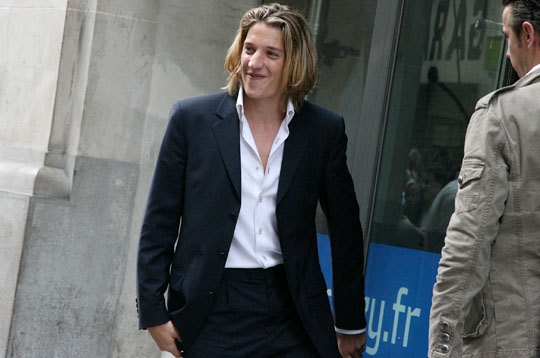Französische und britische Medien berichten, der Sohn des Präsidenten schreibe „Anti-Sarko Rap-Songs“ für „einige der Hardcore-Rapper Frankreichs“. Er firmiert angeblich unter den Namen „Crime Chantilly“ oder „Mosey“.

Und dies ist der junge Mann, Pierre Sarkozy. Sein Vater wollte einst die Ghettos „auskärchern“. Der Sohn schreibt den Soundtrack für die Ghettobewohner?
Aus dem Blog der New York Times:
According to a number of media reports, Mr. Sarkozy’s 23-year-old son Pierre has been quietly producing and writing music for several rappers who strongly oppose the president and have openly declared their hatred of him. One of those artists, a minor rapper using the stage name Poison, took part in an anti-Sarkozy video last year with other rappers, in which he boasted: “Anti-Sarko, anti-right, Nicolas don’t you hear. We’re anti-you.”
Pierre Sarkozy — the oldest of Mr. Sarkozy’s three sons — has long been rumored to be involved in the music industry under an alias. Last year it was widely reported that he had agreed to stop wearing dreadlocks at the request of his father’s campaign.
But his apparent ties to anti-Sarkozy rappers have only recently come to light. According to the French daily newspaper Libération, several months ago a rapper said on stage at a small Paris venue that “Sarko’s son is trying to give us his products under the name Crime Chantilly.” The name is apparently a play on the term Crème Chantilly, as whipped cream is known in French.
Then on Monday, several news outlets — including Reuters, Libération and the Guardian of Britain — reported that the rapper Poison had said in an interview with a hip-hop radio station that Pierre Sarkozy was using the stage name Mosey, and had written a song for Poison’s upcoming album.
“I’m not a Sarkozy guy,” Poison was quoted as saying, adding a couple of expletives. “I didn’t know at the start that it was the son of Sarko. When I found out, I blew a fuse and phoned him. He said ‘Yeah, but Poison, I didn’t want to tell you because you wouldn’t want to hang out with me no more.’ I told him, hey, no problem. You never done me wrong.”
Whether Mosey and Pierre Sarkozy truly are one and the same is not entirely clear, as neither Mr. Sarkozy nor his son has confirmed or denied the rumors. A page on Myspace.com for the producer Mosey displays a photograph of a young man who bears a resemblance to Pierre, who can be seen in photographs with his family in various places on the Web.
If Pierre Sarkozy is indeed producing music for some of the more hardcore rappers in France, it may not sit too well with his father. During a two-year stint as interior minister that began in 2002, the elder Mr. Sarkozy introduced a law that made insulting a police officer a crime, and sparked controversy when he ordered the prosecution of several rappers who he said had incited violence against the police with their lyrics. Mr. Sarkozy was also criticized for saying at one point that he would wage a campaign against youths whom he characterized as “voyous” and “racaille,” terms that can be translated into English as scum or riff-raff.
